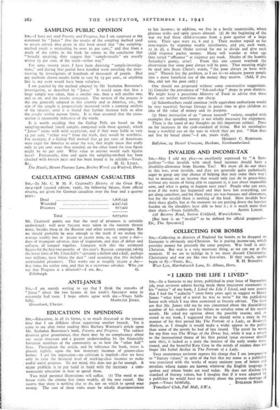EDUCATION IN SPENDING
SIR,—Education, in all its forms, is so much discussed at the present time that I am diffident about suggesting another branch. Yet it came to me after twice reading Miss Barbara Wootton's article upon Mr. Seebohm Rowntree's book, Poverty and Progress. The subject deserves great prominence, that there may be no complacency about our social structure and a greater understanding by the financially fortunate members of the community as to how the "other half" lives. Throughout the article, and by inference the book, stress is placed, rightly, upon the low monetary incomes of poorer-class homes. I got the impression—no criticism is implied—that we have only to raise the financial level of working-class incomes to make useful social progress. To my mind, this does not go far enough. A major problem is to put hand in hand with the increases a com- mensurate education in how to spend them.
Two brief personal illustrations will suffice. (r) The maid at my house visits the cinema five times weekly, all the year round. She asserts that there is nothing else to do, nor on which to spend your money. The cost of these visits must be wholly disproportionate
to her income ; in addition, we live in a lovely countryside; where glorious walks and open spaces abound. (2) At the beginning of the war we had three child-evacuees from a poor quarter of a large town. Their ages were so, 8 and 5. Their mother repaid us for shoe-repairs by sixpenny weekly instalments, and yet, each week, ii in all, a Postal Order arrived for me to divide and give each child sixpence pocket money. Many will wonder at what age they tasted " affluence " at sixpence per week. Shades of the humble
Saturday's penny, arise! From this one cannot overlook the observation that some poor always will be poor. That meaning might be read into Jesus Christ's words, "the poor always ye have with you." Therein lies the problem, as I see it—to educate poorer people into a more beneficial use of the money they receive. (Add, if you like, and not the poor only.) One should not propound without some constructive suggestions. (I) Consider the prevalence of " fish-and-chip " shops in poor districts. We might keep a peacetime Ministry of Food to advise that these meals are neither nutritious nor cheap.
(2) Schoolteachers could continue (with equivalent enthusiasm would be very essential) Savings Groups in peace time to give children an idea of thb value of money and its purpose.
(3) More instruction of an "amuse yourself" variety, coupled with examples that spending money is not wholly necessary for enjoyment.
There is the trend of my thoughts on this important subject. Press on for increases in the cash-standard of living. But let sociologists keep a watchful eye on the uses to which they are put. "Man does not live by bread alone."I am, yours truly,
HERBERT C. ROBINSON.
Ballyhue, 24 Hextol Crescent, Hexham, Northumberland.


























 Previous page
Previous page